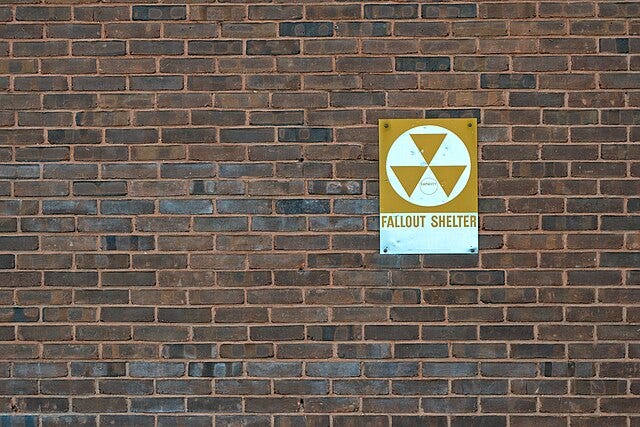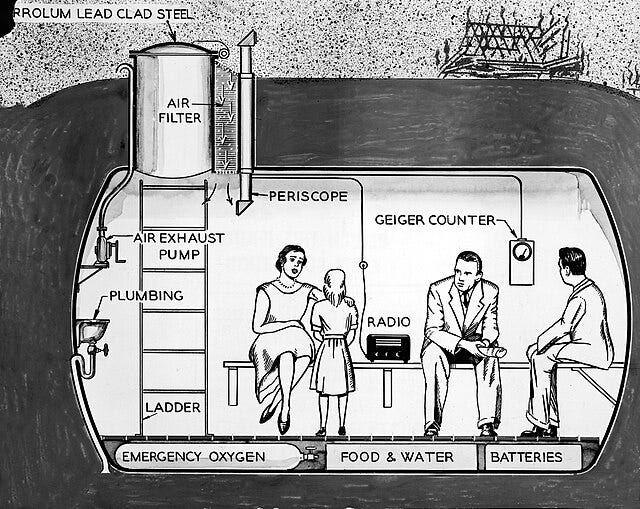Why Billionaires Are Building Bunkers
"What's your extraction plan?"
This week, we’re talking:
Billionaires are getting ready for the end of the world. They’re doing it wrong. 🏚️☢️
Broligarchs are all about free speech—until it turns on them. 📢🚫
D-Wave claims quantum supremacy—this time, solving a real-world problem. Big if true. ⚛️ 🚀
America’s biggest bottleneck isn’t innovation—it’s building the infrastructure to support it. 🏗️🇺🇸
California’s inmate firefighters risk their lives for pennies. Lawmakers might finally give them a raise. 🔥💰
Bad AI is flooding the market with half-baked gadgets. Hype alone won’t save them. 🤖📉
The U.S. is expanding immigrant detention and removing safeguards. It’s a recipe for disaster. 🚨⚖️
My Take:
Lately, I’ve been thinking a lot about the end of the world—nukes, climate catastrophe, all the greatest hits. And I gotta tell ya, I am definitely not the only one with end times on my mind.
At a dinner recently, I found myself next to a guy who said he worked in climate. I figured climate tech, carbon capture, something optimistic. Nope—he builds bunkers. Bunkers for billionaires in the event of climate catastrophe—equipped with food and water and medical supplies, yes. But also swimming pools and tennis courts.
I had questions. And after getting a few drinks in him, it became clear that he had questions too.
The guy had clients who had deals with former Marines and special ops forces to serve as security at their bunkers. "The real question nobody can answer," he confided, "is how you get your staff and security to stay loyal when money ceases to matter?"
This isn’t some one-off weirdo. The more drinks get poured at Silicon Valley parties, the more you hear these kinds of doomsday plans.
I have a friend who will remain nameless, a wealthy guy with a place in Petaluma. He lives in San Francisco but has a fortified property stocked with provisions for two years. He has guns. He has even had his family hike from San Francisco to Petaluma—to rehearse societal collapse.
I’ve always known that prepping isn’t irrational. I studied decision analysis for my PhD, and the logic checks out—risk isn’t just about probability, it’s about impact. Even if the chance of societal collapse is only 0.5%, the cost of being unprepared is existential. So prepping? Sensible. But how you prep—that’s where things go sideways. And my bunker-builder dinner companion put his finger on the real problem: the billionaire system is built to fail.
I mentioned this conversation to a friend—sheepishly, for fear of judgment—who promptly revealed all the prepper-esque steps she had already taken. A go-bag. Bolt cutters. Water. Canned food. The works.
I asked her what the weirdest thing in her prep kit was. Without hesitation, she replied: "Fifty can openers."
"Why?!" I asked.
"Well," she replied, "if shit hits the fan, everybody is going to need a can opener."
This is how my non-billionaire friend thinks about survival—something practical, something shareable. If society collapses, she figures, she’ll trade in the currency of utility. And in her mind, surviving isn’t just about her; it’s about making sure people around her have what they need, too.
Billionaires are so used to money equating to power that they assume it always will. They don’t see the paradigm shift coming—that when the Four Horsemen start saddling up, cash won’t mean much to the guy holding the last can of beans. They’ve built their world around the assumption that money is power, but they haven’t reckoned with what happens when that reality collapses. When money no longer holds sway, what’s left? A bunker full of supplies and a security team who quickly realizes how easy it would be to pilfer them.
Power doesn’t come from stockpiles—it comes from relationships, from trust, from being part of a community that actually gives a damn about you. And that’s what billionaires don’t get. If everything falls apart, who’s coming to save them? Nobody.
They’ve spent their lives outside the social fabric, surrounded by people paid to be there. No real ties, no real loyalty. When the social contract breaks, the people with the pitchforks won’t hesitate; they know exactly who hoarded everything. And that’s what I think about every time someone tells me about their doomsday bunker in New Zealand or their extraction plan to Kentucky. Nice-to-haves, sure. But when the world ends, it won’t be bunkers that save you, it’ll be people. You’ve got to have friends at the end of the world.
Maybe that’s why the richest people on earth—the ones who usually feel untouchable—are the ones losing sleep building bunkers stocked with luxury but bereft of logic. Or community.
My Media Diet:
Meta rep flagged 'critiques of tech industry figures' as 'sensitive or controversial content' by Taylor Lorenz via UserMag 📢🚫
As the Trump administration and other tech billionaires seek to crack down on speech and roll out mass censorship policies while hypocritically using the language of “free speech,” users are increasingly worried… Several billionaires and powerful political figures have begun pushing for censorship under the guise of “free speech.” Musk, for instance, while claiming to transform X into a “free speech haven,” has restricted the use of words like “cisgender,” downranking and punishing creators who use the term or speak about LGBTQ rights. He has permanently banned journalists and researchers who have reported critically on him, artificially inflated his own content in the feed, and Twitter has also complied with government censorship requests around the world.
D-Wave Claims It Achieves ‘Quantum Supremacy.’ What the Breakthrough Means for Quantum Computing by Mackenzie Tatananni via Barron’s ⚛️ 🚀
D-Wave maintains that it is the first to demonstrate quantum supremacy using a real-world problem with relevance to materials discovery, rather than a “random number generation of no practical value,” in the words of CEO Alan Baratz. The paper demonstrated how D-Wave’s Advantage2 processor was able to solve a simulation problem faster than Hewlett-Packard Enterprise’s Frontier, currently the second-most-powerful supercomputer in the world. The 1,200-qubit Advantage2 processor used in the experiment became available through D-Wave’s quantum cloud service in February 2024. While it is just a prototype, D-Wave said the design was based on years of client feedback.
Why America Struggles to Build by Brian Deese via Foreign Affairs 🏗️🇺🇸
The United States needs to build more to unlock growth from innovation. The digital age birthed most of the businesses that define the current U.S. economic landscape; only five companies that were on the Fortune 100 list in 1990 are still on it today. Infrastructure investment in telecommunications, including fiber-optic cables, enabled that shift to digitization. Today, a new set of technologies—in artificial intelligence, advanced computing, biomanufacturing, and energy—present even greater innovation potential. But this can be enabled only by physical infrastructure: data centers, semiconductor factories, transmission lines, and more. Around the world, countries will have to build twice as many data centers in the next five years as they built in the past two decades to meet growing demand. To maintain a technological edge in AI, the United States must keep pace with this expansion. More than at any other moment in the past half century, the United States’ potential to innovate will be limited by its ability to build.
California lawmakers may give inmate firefighters a raise by Anabel Sosa via LATimes 🔥💰
More than 1,100 inmates in the state Department of Corrections and Rehabilitation — a group that has historically made up 30% of the California wildfire force — helped battle the Palisades and Eaton fires. They currently earn $5.80 to $10.24 a day, according to the department’s website… Adam Cain, another former inmate who worked for the California Department of Forestry and Fire Protection while incarcerated during the 2020 wildfires, said he experienced difficulties breathing due to wildfire smoke and “helping others survive” traffic collisions. Cain said higher wages would help prisoners pay for food and hygiene, pay restitution that they owe to victims and their families, or save money for after they are released.
All this bad AI is wrecking a whole generation of gadgets by David Pierce via The Verge 🤖📉
It’s not just big companies, either. For the last year or so, the hottest thing in startups has been “put a microphone on a lanyard, record your whole life, and use AI to do… something with it!” That’s the pitch for Friend, and Omi, and Limitless, and Plaud, and Bee, and so many others. Jony Ive and OpenAI are working on some kind of AI hardware together. Investors poured huge money into Humane, only to see that collapse less than a year after its first launch. Rabbit’s R1 was a flop. None of these devices have so far been compelling, and some of them just plain don’t work. To be fair, product makers are in a tough spot right now. If you believe AI is a paradigm shift, that it will change the world the way smartphones or the internet did, you’d be foolish to wait around for the tech to be perfect. By then, it’ll be too late, and you’ll have lost the race. The problem is that too many companies have made all their plans based on some theoretical and perfected end state of AI, rather than looking for ways to make it useful right now.
How Many Immigrants Will Die in U.S. Custody? by Jack Herrera via The New Yorker 🚨⚖️
Jails are dangerous places, and Donald Trump plans to lock up more immigrants than ever before. Right now, Immigration and Customs Enforcement jails around forty thousand people at any given time. The new Administration intends to more than double that, to a hundred thousand people—close to the number of Japanese Americans kept in internment camps during the Second World War. Immigrants will be held in hastily prepared detention centers and military bases; more than a hundred have already been sent to Guantánamo Bay. Expedience will be prioritized above all else. Last month, Tom Homan, Trump’s “border czar,” told an annual gathering of the nation’s sheriffs that the Administration planned to lower federal immigration detention standards so they could find more room in local jails. Children won’t be exempt. The Administration is re-starting family detention.






The bunkers introduce that touch of absurdist comedy to the proceedings. Never, under any circumstance, associate excessive wealth with superior intelligence. The link just isn’t there.
https://substack.com/@brutusmac/note/c-153064370?r=6aexdu&utm_medium=ios&utm_source=notes-share-action